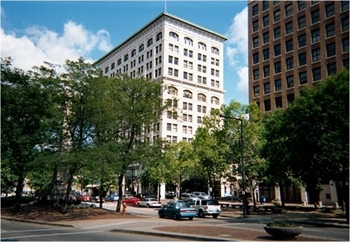
Image from http://www.ymc.lib.oh.us
Mayor Williams' message truly inspired me and many of the 60-plus attendees of the Urban Exchange event at the RailCats Stadium. My colleague Marisa Novara has already summarized the key approaches Youngstown is taking, so I won’t try to define those here. However, I do want to share some of what I learned from his visit, which was first and foremost the clear importance of leadership and an engaged and active citizenry.

The Youngstown 2010 Plan--the basis for revitalization efforts in Youngstown--was driven by hundreds of individuals and organizations who are now supporting its ongoing implementation. One of the most powerful ways those stakeholders have driven that plan is by electing a mayor who was involved in its development and committed to its institutionalization. Mayor Williams has clearly been that champion, bringing national attention to Youngstown, helping redefine the city’s image to visitors and businesses, and pulling partners together behind the plan. In his discussion, he stressed several important points:
There is no silver bullet. For too long, Youngstown stood still, waiting for one or two major employers to come in and rescue the city. In today’s changing economy, city’s like Youngstown and Gary must focus on diversifying the local economy. Gary’s Mayor Rudy Clay emphasized this point as well, during the event, as he spoke about shoring up and expanding Gary’s tax base. Mayor Williams also stressed there can be no silver bullet when it comes to leadership. With scarce resources, elected officials cannot save the day and, just like waiting for industry, communities can’t wait for one leader to change things. The challenges demand a strong partnership, involvement, and robust discourse between public officials and citizens to take ownership of the plan and support ongoing success. Being a term-limited mayor, Mayor Williams explained what will define his success is whether he has developed a framework for a younger generation to step in, forward and shape current efforts to reinvent the city. He affirmed “young people have to believe Youngstown isn’t a city to move away from, but to make a mark on.”
Locally driven plans must be institutionalized. For progress to continue, the resident-driven Youngstown 2010 plan can’t die with changes in elected leadership. Recognizing this, when it was time to review the city’s charter, Mayor Williams worked to include the Youngstown plan, requiring the city to regularly review and update it and continue to engage the community as this happens.
The city and region must reconnect. Across the country, historic divides continue between regions and the older communities that spurred their growth. However, as Mayor Williams has worked to build support around regional investment in Youngstown and promote the role the city plays in the region and its economy, he found it was hard to find anyone who would argue against the view that a better Youngstown is a better suburban region. While sometimes urban core challenges seem insurmountable, it’s hard to picture the scenario where they don’t exist. The assets are too great and stakes too high to let them disappear. As such, the mayor and others have worked to strengthen regional partnerships, particularly through the development of the region’s 2040 comprehensive plan. Youngstown has seen more cross-border collaboration with neighboring communties as a result.
Be open to outside help. Insular approaches make it difficult to break from historic patterns that are no longer working. While efforts must be locally driven, engaging outside assistance helps to bring a fresh perspective. In Youngstown’s case, many saw the identity of the city as linked to its industry. As such, to them, the loss of that industry meant the death of the city. Engaging residents and outsiders helped shape a vision that moved beyond the city's industrial history to what the city can be. In addition, bringing in other partners helped attract positive attention to Youngstown, and new resources along the way.
Strengthen nonprofit partners. Having local, independent and reputable community development partners has been essential to Youngstown’s early success. Not many able organizations existed, so the city worked closely with local and national philanthropic partners to target their resources to align with the Youngstown 2010 plan and build the capacity of local nonprofits, such as the Youngstown Neighborhood Development Corporation, to carry forward key pieces of the work. Click here to see a video.
One thing Mayor Williams said has stayed with me: “While the problems plaguing Youngstown persist, the city is now being defined by the approaches it is taking to those problems, not the problems themselves.” To me, this is key. Perceptions of waste and limited capacity have hindered investment and partnerships in many formally industrialized communities. Promoting a strong vision and making the hard choices to forward that vision is what will bring investment back. In wrapping up the successful event in Gary, U.S. Rep. Pete Visclosky (D-Ind.) eloquently captured the thoughts of the audience when he said Mayor Williams’s message was "well worth the wait,” and thanked him for the inspiration he provided to the region. I second that!
To see his full presentation, click here.